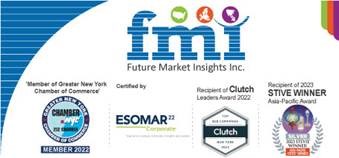Smart Water Metering Market is estimated to grow at a CAGR of 10% from 2023 to 2033

Image source: Future Market Insights
With urbanization and globalization on the rise, monitoring water usage has become essential. Smart water flow meter has emerged as a viable solution for water utility providers to improve operational efficiency. Compared to traditional water meters, smart water meters provide customers with more information about their water consumption, thereby improving water usage and reducing wastage. Consequently, the demand for smart water meters is expected to surge in the coming years.
Smart water meters come with features like wireless connectivity, data collection, and cellular connectivity, which offer an integrated infrastructure for water utilities and reduce wiring costs. Additionally, with technology evolving rapidly, smart water meters provide remote identification and other benefits, which are expected to improve the efficiency of smart water metering infrastructure in the future.
The analysis of the global smart water metering market divides the industry into three distinct segments: hardware, software, and services. The hardware industry is expected to grow at the fastest rate over the next five years. Measurement instruments, modules, pressure sensors, and complementary hardware are all included.
The forecast indicates that meter demand will be high. The meter is an essential part of the smart water meter because it provides information about the water consumption of homes and businesses. Smart water flow meter systems come in a wide range of varieties, each catering to specific needs in terms of accuracy requirements and flow measurement techniques. These meters can be used with either cold or hot water and feature digital readouts for a wide range of useful data, including the detection of leaks, pipe bursts, tampering, dryness, reverse water flow, and ambient/meter temperatures.
The rising demand for smart water metering hardware, including meters, modules, and pressure sensors, is expected to fuel the industry's expansion over the forecast time frame.
Key Takeaways
Smart water metering is gaining popularity due to the rise in urbanization, globalization, and population growth.
Smart water meters provide customers with more information about their water consumption, thereby improving water usage and reducing wastage.
Wireless connectivity, data collection, and cellular connectivity can provide integrated infrastructure for water utilities, lowering wiring costs.
The demand for hardware components such as meters, modules, and pressure sensors is expected to surge during the forecast period, contributing to the growth of the smart water metering market.
The Asia-Pacific region is projected to dominate the smart water meter market, due to the growing demand for water conservation and the increasing adoption of smart technologies.
Source: Future Market Insights





